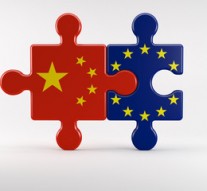
What is at stake in the new EU Strategy on China?
External Relations 2 August 2016The priority of the new EU strategy on China is the promotion of long-term benefits for Europe and China’s citizens.
While China and the EU continue to develop their partnership as two of the three biggest economies and trading leaders in the world, the adoption of new elements in the Joint Communication for a new EU strategy on China has presented major opportunities.
Adopted in 2013, the highest-level joint document in EU-China relations sets out the cooperation in the areas of peace, prosperity, sustainable development and people-to-people exchanges. China’s ongoing development continues to emphasise its importance to the EU: the priority of this communication being the promotion of long-term benefits for EU and Chinese citizens.
Trade: the key for prosperity and sustainable growth of both the EU and China
Worth over 1.5 billion Euros a day, the trade in goods between China and the EU have solidified a significant stake in each other’s prosperity and sustainable growth. In 2014, the EU accounted for nearly 16% of total foreign direct investment (FDI) inflows into China, subsequently making it one of the top FDI providers to the country.
As a result, this makes the EU the most important destination for Chinese outward investment, and the Comprehensive Agreement on Investment which is currently being negotiated between the two sides aims to improve the protection of such investments, access to the markets and the overall climate for Chinese investors in the EU, and EU investors in China.
The 17th EU-China Summit: a mutual interest that goes beyond trade
The 17th EU-China Summit saw the confirmation of the countries’ strong interest in each other, their investments and relevant initiatives including the ‘Investment Plan for Europe’ and the “One Belt, One Road” initiative. Additionally, both countries support effort to improve connectivity in Asia for the benefit of all European and Asian partners.
Engagement between the two countries stretches beyond trade and investment to the field of research and innovation cooperation, active people-to-people engagement and the rule of law and human rights. Inter-cultural dialogue has encouraged tourism between the partners and more than 30,000 people have already benefitted from scholarships to study-work or conduct research in both the EU and China.
EU Concerns over human rights in China
Furthermore, the EU has reiterated its commitment to the promotion of human rights around the world; regularly voicing its concern over the human rights concern in China. With a dedicated EU-China Human Rights dialogue held every year, this has been extended to include attempt to establish a better understanding of their respective legal systems. The first dialogue was held in Beijing on 20-21 June 2016.
For more information on the EU-China relations in terms of climate policy, read “Agreed in Beijing a EU – China Energy Roadmap.”
With China remaining a critical juncture, it is vital that the EU capitalise on the ability to assist it in its shift towards a more balanced pattern of development. Further, it is evident that internal change within China is likely to have substantive external impact, both economically and financially. As such, the decisions China makes regarding its political, economic and social development are more important to the EU than ever.


